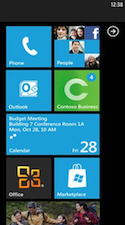Why Windows Phone 7 Was a Flop (So Far)

From the day that it was announced, Windows Phone 7 sounded like a very promising mobile product for both individuals and businesses. Even before it was heavily advertised to the general public, we as consumers and technology enthusiasts were flooded with the prospects of a truly revolutionized mobile OS and a completely revamped user experience. Simply put, Windows Phone 7 was expected to not only revolutionize the mobile industry, but pay off well for Microsoft and LG – the two companies vested into the product – as well.
However, as stated in a recent Pocket-Lint interview with James Choi – LG’s marketing and planning director – the Windows Phone 7 has yet to produce the results or success that LG had expected to see.
Choi starts off the interview by stating that the Windows Phone 7, which was announced in October of last year, had “less than…expected” visibility “from a consumer point of view.” Off the bat, many may take this statement to mean that LG and Microsoft had not put in enough effort in advertising the product and making the public aware of its availability and features, and for this reason have not developed the brand and product recognition necessary for their success. However, as Jeff pointed out in December, Windows Phone 7 has been the subject of a relatively large advertising campaign by Microsoft and LG that has populated television stations for months now.
The sad reality is that there are a great number of consumers who have little to no faith and Microsoft products and are unwilling to even fathom the though of using them in their day-to-day lives. For this reason it is safe to say that there are is at least a small group of people who are seeing the advertisements for the phone, however are choosing to turn a blind eye to them. Even with more recent Microsoft products such as Windows 7 and Office 2010 being more user-friendly and reliable, one cannot deny the damage that “buggy” products like Windows Vista did to Microsoft’s image in the recent past.
In this same sense, Microsoft has had a strong image for having a stable and reliable mobile operating system for quite some time now. Windows Mobile, as it was dubbed, was somewhat of a complex mobile operating system and was focused more towards productivity in business environments than social media and use by consumers – the exact features that Windows Phone 7’s image is built on. With this in mind, I think many people have associated Windows Phone 7 too closely with the now-defunct Windows Mobile product line, and have not realized the new focus on consumer and casual users.
In terms of user-friendliness and operational ability, Choi also admits that technology enthusiasts who do more advanced things with their phones “might [find Windows Phone 7 to] be a little bit boring after a week or two.” This statement makes a lot of sense simply because Windows Phone 7 is marketed as a phone which one can easily perceive to be over-simplified and lacking in terms of extensibility for “power-users.”
What does this mean? Simply put, Windows Phone 7 is in a form of a gridlock. Some consumers are unwilling to look at the device because of the background of Windows Mobile in more business-like and professional environments, whilst other users are unwilling to take on the phone because they see it as “dummied-down.” However, this could also be seen as a benefit for users looking for the most simplistic experience possible.
Availability-wise, Choi also points out that Windows Phone 7 is somewhat of a resource-intensive phone with relatively high “hardware requirements” that are ultimately “limiting growth.” With “mid-tier to low-tier” hardware becoming available in the distant to near future Choi, however, seems convinced that the product will catch on once uses have the ability to purchase hardware that is affordable and reasonable for their uses.
Last but not least, I think there are simply a number of users who are genuinely interested in Windows Phone 7 that have decided to play it safe and wait for the product line to not only become more proven, but more feature-rich as well. Look at the Nexus One for example, where users who were quick to adapt what was initially seen as a revolutionary phone and mobile OS were quickly stuck with outdated hardware and software as developments to Android (and its requirements) were made at such a rapid pace. This, I believe, is the type of situation that many people are trying to avoid. Combine this with the spotlight-stealing iOS and Android mobile operating systems, and I can easily see why users may be choosing to stay away from Windows Phone 7 for now.
When it comes down to it, Windows Phone 7 doesn’t look like a bad product by any stretch of the imagination. In fact, the most in-depth overview of Windows Phone 7 was on a recent episode of Diggnation [some adult content], where Alex Albrecht showed off his recently purchased device. And, I have to say that the Windows Phone 7 really does seem to pack a punch – especially for a first generation product.
But in the end, only time will tell how the initial releases of the Windows Phone line turn out, and if future generations of the product will become true players in the mobile wars.
What do you think of the Windows Phone 7? Have you purchased one? If so, what drew you to the phone? Likewise, if you’ve looked at the Windows Phone 7 and ended up purchasing another product, what drew you away from it? Best yet, what kind of future do you think Microsoft and LG will have for the Windows Phone product line? Let us know in the comments!